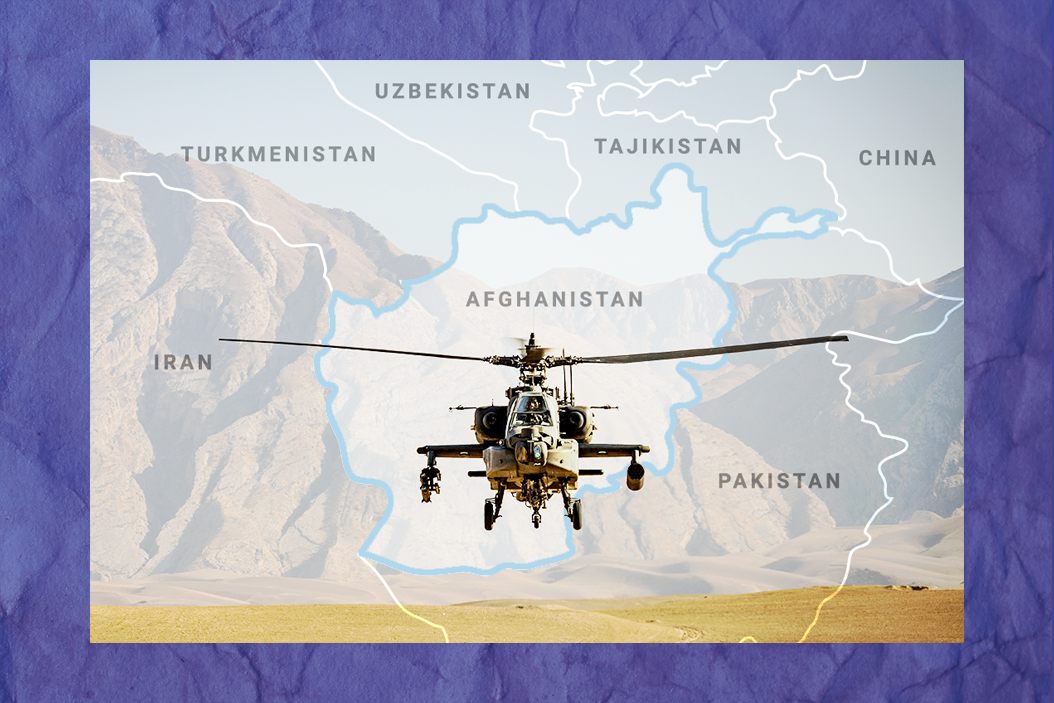July 06, 2021
For almost two decades, the fraught security situation in Afghanistan has largely been, for better or worse, America's responsibility. But now, with the long-awaited US withdrawal set to be complete way ahead of the September 11 deadline set by the Biden administration, suddenly neighboring countries are thinking: Wait, what's our Afghanistan strategy? Do we even have one? What will we do when the Americans leave? Do we want them to leave a toothbrush behind, just in case?
Some of Afghanistan's neighbors are nervous. Over the weekend, Russia's top diplomat Sergey Lavrov admitted he's "worried" about Taliban-backed militants taking control of vast swaths of territory in northern Afghanistan. (Yes, this is the same Lavrov who just two years ago was calling for all foreign troops to leave the country.)
The Russians, along with the Chinese, fear that if the Taliban further destabilize Afghanistan, that instability will spill over to the five Central Asian countries, which have their own history of jihadist violence. All are former Soviet republics which Moscow still regards as part of its sphere of influence, and which China imports a lot of oil and natural gas from.
For their part, beyond jihadists, the last thing the Central Asian stans want is an Afghan refugee crisis on their borders. In the past few days one of them — Tajikistan — has seen over 1,000 members of the retreating Afghan army cross over into its territory as they fled the Taliban.
What's more, this is just the beginning. All major players involved, including the US, agree that a Taliban takeover of Afghanistan is no longer a question of if, but rather when. Without American and NATO support, the Afghan army won't be able to fend off the Taliban much longer — it could all well be over within just six months, according to the latest US intelligence. Pakistan, Afghanistan's most influential neighbor, is well aware of this.
Meanwhile, the US has been quietly reaching out to Kazakhstan, Tajikistan, and Uzbekistan for permission for US intelligence operatives to keep tabs on the Taliban from their territory. Washington also wants these countries to temporarily host the families of thousands of Afghan translators while they wait for US visas.
Intel operations is probably as good as it will get for the US, since Russia and China will not permit US bases in the region. The Central Asian republics, which do most of their trade with Russia and China, have little say in the matter.
Still, America's interests in the region will soon align with those of its two main adversaries: Russia and China. None of them wants to be in Afghanistan, but all want the country to be relatively stable, even if it's run by the notoriously unpredictable Taliban.
The US has to watch the Taliban to ensure they don't take revenge on America for ousting them from power in 2001. Russia is probably okay with that provided the US footprint is very light, and it prevents Taliban-hosted militants or Afghan refugees from causing problems for the Central Asian republics. And China needs for Afghanistan to not descend into another civil war because Beijing is eager to tap into Afghanistan's mineral wealth, support its ally Pakistan, squeeze out India, and stop Uyghur separatists operating from Afghan territory.
Even Pakistan may appreciate limited American intelligence operations to ensure the future Taliban government doesn't threaten its own porous borders — as long as US drones and spies stay away from Pakistani soil.
No more safety net. Most of Afghanistan's neighbors have spent the last 20 years relying on the US and NATO to resolve the country's problems. Now that the foreign troops are almost gone, they — and the Afghan people — will have to deal with Afghanistan (almost) entirely on their own.From Your Site Articles
- Afghanistan: the potential pitfalls of an unconditional US troop ... ›
- “We're going to see a descent back into chaos” in Afghanistan: Rep ... ›
- As the US withdraws from Afghanistan all eyes are on Pakistan ... ›
- Haitian president's killing reflects unprecedented rise in violence - GZERO Media ›
- The US can advance democracy without being the world's sheriff ›
- Taliban takeover embarrassing for Biden; political impact of wildfires - GZERO Media ›
- No exit from Afghanistan - GZERO Media ›
- No exit from Afghanistan - GZERO Media ›
- Afghanistan’s crisis deepens: Fawzia Koofi on Taliban rule and global response - GZERO Media ›
More For You
With close ties to both the US and China, can Singapore survive in an increasingly fragmented and chaotic world? Singapore’s President Tharman Shanmugaratnam joins Ian Bremmer on the GZERO World Podcast.
Most Popular
Think you know what's going on around the world? Here's your chance to prove it.
UK Prime Minister Keir Starmer shakes hands with Chinese President Xi Jinping, ahead of a bilateral meeting in Beijing, China, on January 29, 2026.
Carl Court/Pool via REUTERS
This week, Prime Minister Keir Starmer became the first UK leader to visit China in eight years. His goal was clear: build closer trade ties with Beijing.
Igmel Tamayo carries charcoal to sell on the side of a road for use as cooking fuel in homes, after US President Donald Trump vowed to stop Venezuelan oil and money from reaching the island as Cubans brace for worsening fuel shortages amid regular power outages, on the outskirts of Havana, Cuba, on January 12, 2026.
REUTERS/Norlys Perez
© 2025 GZERO Media. All Rights Reserved | A Eurasia Group media company.
